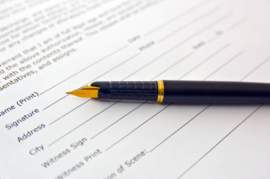
Pennsylvania Landlord Tenant Law

Guide to Pennsylvania Landlord Tenant Law
If you are renting a house or apartment in Pennsylvania, or if you own units that are rented, understanding PA landlord tenant law can make it easier for you to stand up for your rights. Both landlords and tenants have rights and responsibilities under Pennsylvania landlord tenant law. This guide can explain the basics of how PA landlord tenant law may affect you as a tenant or a landlord. If you need more in depth information or advice, you may want to consult with an attorney versed in Pennsylvania landlord tenant law.
Landlord Responsibilities
A landlord has several responsibilities toward tenants in PA landlord tenant law. Landlords must abide by the terms of any lease agreement they have set up with a tenant, and they must maintain the house in habitable condition. This means that according to Pennsylvania landlord tenant law, a landlord must make sure that tenants have access to safe, clean hot and cold water, electricity, and heating, and that the unit is in generally good repair and free from pests.
Landlords are also required to permit tenants to have quiet enjoyment of their property. Under PA landlord tenant law, a landlord may not harass or intimidate a tenant for any reason, and must give reasonable notice before entering an occupied unit. The only time when a landlord is not required by Pennsylvania landlord tenant law to give notice is when an emergency repair needs to be conducted. If such a repair is needed, the landlord needs only to give as much notice as is possible given the situation.
Landlords are also responsible for returning a tenant's security deposit after a tenant has left or providing written notice as to why not all of the deposit will be returned. If a landlord is delinquent in returning this security deposit, a tenant may be able to sue in small claims court.
Tenant Responsibilities
Tenants are required to abide by the terms of their lease agreement with their landlord, provided the lease agreement is legal according to Pennsylvania landlord tenant laws. Tenants are also responsible for paying their rent on time.
While minor damage to an apartment or house is typically considered to be normal wear and tear and cannot be deducted from a security deposit, tenants also have a responsibility to keep the premises from being damaged as much as possible. Causing excessive damage beyond normal wear and tear allows a landlord to begin eviction proceedings in PA landlord tenant law.
Evictions
Landlords are not permitted by Pennsylvania landlord tenant law to evict a tenant with so-called “self help methods.” The only way to evict a tenant legally according to PA landlord tenant law is to go through the court system and obtain a lawful eviction order. If a landlord resorts to moving a tenant's belongings, shutting off a tenant's utilities, or changing a tenant's locks in order to evict them, the tenant may be able to sue the landlord for violations of Pennsylvania landlord tenant law.



















